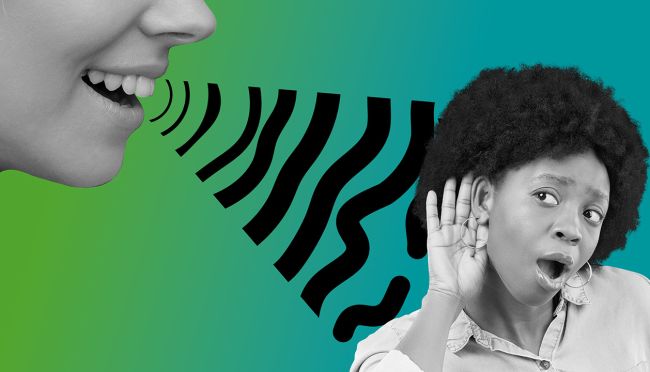Perception →
→

- 06 Nov 2023
- Research & Ideas
Did You Hear What I Said? How to Listen Better
People who seem like they're paying attention often aren't—even when they're smiling and nodding toward the speaker. Research by Alison Wood Brooks, Hanne Collins, and colleagues reveals just how prone the mind is to wandering, and sheds light on ways to stay tuned in to the conversation.

- 24 Jan 2023
- Research & Ideas
Passion at Work Is a Good Thing—But Only If Bosses Know How to Manage It
Does showing passion mean doing whatever it takes to get the job done? Employees and managers often disagree, says research by Jon Jachimowicz. He offers four pieces of advice for leaders who yearn for more spirit and intensity at their companies.

- 06 Dec 2022
- Research & Ideas
Latest Isn’t Always Greatest: Why Product Updates Capture Consumers
Consumers can't pass up a product update—even if there's no improvement. Research by Leslie John, Michael Norton, and Ximena Garcia-Rada illustrates the powerful allure of change. Are we really that naïve?

- 19 May 2020
- Working Paper Summaries
Global Behaviors and Perceptions at the Onset of the COVID-19 Pandemic
An online survey of more than 110,000 people in 175 countries conducted at the onset of the COVID-19 pandemic found that most respondents believe that their governments and fellow citizens are not doing enough, which heightens their worries and depression levels. Decisive actions and strong leadership from policymakers change how people perceive their governments and other citizens, and in turn improve their mental health.

- 17 Mar 2020
- Working Paper Summaries
From Sweetheart to Scapegoat: Brand Selfie-Taking Shapes Consumer Behavior
Using a dataset of more than 280,000 user reviews on Yelp, this paper describes a series of eight studies exploring how brand selfie-taking affects consumers’ behavior and sense of connection toward a brand.

- 11 Dec 2019
- Working Paper Summaries
When to Apply?
Using a series of experiments, the authors studied gender differences in how job-seekers perceive their own qualifications for different opportunities and how this affects their decision to apply. Results suggest that soft touch employer interventions can improve the diversity of applicant pools even if candidate beliefs about their own ability are unchanged.

- 04 Sep 2019
- Research & Ideas
'I Know Why You Voted for Trump' and Other Motivation Misperceptions
We often make knee-jerk assumptions about what motivates other people’s choices, a bad habit both in the political and business worlds. Kate Barasz explains what we can do about it. Open for comment; 0 Comments.

- 04 Mar 2019
- Working Paper Summaries
The Revision Bias
Companies often release revised editions of books, director’s cuts of movies, and technological updates, on the assumption that revising products and services leads to better outcomes. Nine studies, however, document the revision bias: the tendency to prefer things that were revised, regardless of whether the revised versions are objectively better than their predecessors.

- 25 Feb 2019
- Research & Ideas
How Gender Stereotypes Kill a Woman’s Self-Confidence
Researchers believe gender stereotypes hold women back in the workplace. Katherine Coffman's research adds a new twist: They can even cause women to question their own abilities. Closed for comment; 0 Comments.

- 05 Feb 2019
- Working Paper Summaries
Stereotypes and Belief Updating
Increasing evidence demonstrates that stereotyped beliefs drive key economic decisions. This paper shows the significant role of self-stereotyping in predicting beliefs about one’s own ability. Stereotypes do not just affect beliefs about ability when information is scarce. In fact, stereotypes color the way information is incorporated into beliefs, perpetuating initial biases.

- 17 Nov 2017
- Working Paper Summaries
Equity Concerns Are Narrowly Framed
This paper based on a large online study finds that individuals tend to differentiate in their concerns about fairness along specific dimensions, especially time and money, and are much more worried about fairness in one (time) than the other (money). These attitudes may help explain a seemingly wide variety of phenomena.

- 06 Sep 2017
- Working Paper Summaries
Class Matters: The Role of Social Class in High-Achieving Women's Career Narratives
This analysis of interviews with 40 female executives and entrepreneurs highlights five distinct types of career narratives that high-achieving women employ to explain their own career success. These narratives vary with the women’s family-of-origin social class. Among its contributions to practice, the study sheds light on the diversity of approaches possible in a successful career.

- 24 May 2017
- Working Paper Summaries
Reinventing the American Wine Industry: Marketing Strategies and the Construction of Wine Culture
Since the 1960s, the United States has seen spectacular growth in wine consumption. This paper explores how businesses reinveted the image of wine. This creation of the new market, like other consumer products, had social and cultural consequences. In the US, wine became a status symbol and a renforcer of social and class divisions.

- 12 May 2017
- Working Paper Summaries
Equality and Equity in Compensation
Why do some firms such as technology startups offer the same equity compensation packages to all new employees despite very different cash salaries? This paper presents evidence that workers dislike inequality in equity compensation more than salary compensation because of the perceived scarcity of equity.
- 01 Jun 2015
- Research & Ideas
The Surprising Benefits of Oversharing
In a social media culture that encourages sharing of embarrassing information, revealing too much can benefit individuals but hurt businesses. New research papers from Leslie John and Michael Luca help explain why. Open for comment; 0 Comments.

- 14 May 2015
- Working Paper Summaries
Humblebragging: A Distinct-and Ineffective-Self-Presentation Strategy
To humblebrag is to make a boast sound like a complaint, as in the example, "It annoys me when people mistake me for a celebrity." Humblebragging is so common in social media and everyday life that one could assume it is an effective self-promotional tactic. Yet five studies show this tactic tends to backfire because it makes other people doubt the sincerity of the humblebragger. Indeed, straightforwardly bragging is the better way to go. The authors of this paper also examine the psychology underlying humblebragging as an impression management tactic and highlight the role of perceived sincerity in impression management. Closed for comment; 0 Comments.
- 19 Jan 2015
- Research & Ideas
Is Wikipedia More Biased Than Encyclopædia Britannica?
By identifying politically biased language in Encyclopædia Britannica and Wikipedia, Feng Zhu hopes to learn whether professional editors or open-sourced experts provide the most objective entries. Open for comment; 0 Comments.
- 25 Jul 2013
- Research & Ideas
Why Unqualified Candidates Get Hired Anyway
Why do businesses evaluate candidates solely on past job performance, failing to consider the job's difficulty? Why do university admissions officers focus on high GPAs, discounting influence of easy grading standards? Francesca Gino and colleagues investigate the phenomenon of the "fundamental attribution error." Closed for comment; 0 Comments.
- 10 Mar 2011
- What Do You Think?
To What Degree Does the Job Make the Person?
Summing Up: Jobs shape us as much as we shape our jobs, Jim Heskett's readers suggest. Closed for comment; 0 Comments.

Why Companies Should Share Their DEI Data (Even When It’s Unflattering)
Companies that make their workforce demographics public earn consumer goodwill, even if the numbers show limited progress on diversity, says research by Ryan Buell, Maya Balakrishnan, and Jimin Nam. How can brands make transparency a differentiator?